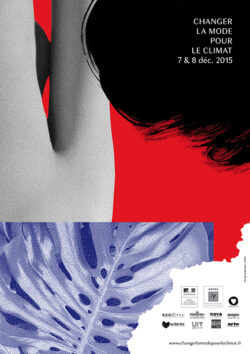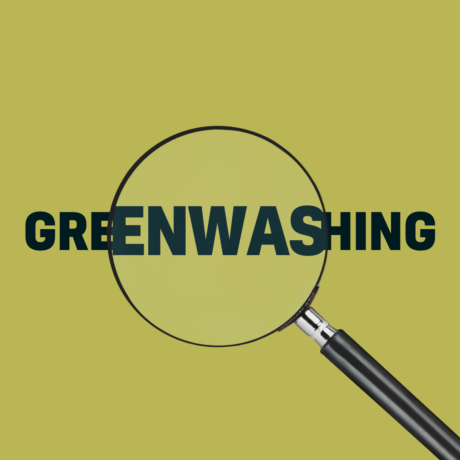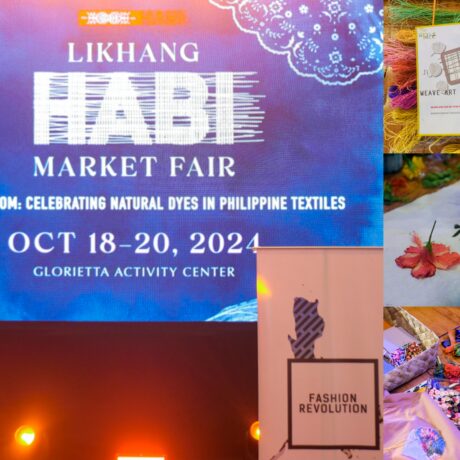COP21 : Changing Fashion for the sake of the climate
On the occasion of COP21 in Paris, the association Universal love presents Changing Fashion for the sake of the climate. This event is supported by Ségolène Royal, Minister of Ecology, Sustainable Development and Energy.
COLLOQUIUM IN PARIS : “Changing Fashion for the sake of the climate”
 How can we reduce the environmental impact of fashion?
How can we reduce the environmental impact of fashion?
State of the art, ongoing solutions, testimonies
Guest expert: Corinne Lepage, lawyer, European deputy, former Environment minister.
This colloquium proposes an overview of all the stages in the life cycle of an article of clothing and the various impacts associated with each throughout the production cycle.
We will present ongoing solutions and technological innovations (from the fiber to the finished product: raw materials, energy, water, transportation, waste, care and end-of-life).
A White Paper will then summarize the available solutions for reducing greenhouse gas emissions and preserving the environment (water, energy, biodiversity) for the whole fashion and clothing sector and at each production stage. It will be made available to all the sector’s professionals.
// SCHEDULE //
Welcome speech by an elected official, representative of the city of Paris
Introduction to the topic by Jean Jouzel: “Worldwide Challenges of Global Warming”
Presentation of OECD actions for the textile sector by a representative of the French PCN
Issues addressed: Which stages/processes have the greatest impact on global warming? How can their impact be reduced?
How can we establish a dialogue with designers? How can we combine creativity with social and environmental constraints? Which materials should we select? Which regulations should be respected? Where can we find the right sourcing? Which selection criteria?
Cabinet Martine LEHERPEUR: Caroline BIANZINA
Pôle ECO-CONCEPTION: Samuel MAYER
Association OREE: Hélène LERICHE
Issues addressed: use of pesticides and water issues in particular concerning cotton. Grading of fibers according to their environmental footprint. Natural fibers: the polluting procedure concerning the transformation of bamboo fiber into viscose, etc. Synthetic, biosourced fibers
ENSAIT Roubaix: Anne PERWUELZ
Agence MU: François Xavier FERRARI
CITIZEN LUXURY: Cécile LOCHARDRoundtable N°3 – Spinning, weaving, processing
Issues addressed: What are the most polluting processes? How can we minimize the impacts?
Spinning and weaving of recycled or other fibers: Are these fiber spinning processes really less impactful? What are the alternatives? What are the technical difficulties?VERNE-et-CLET: Didier BUTOR
TEXTEL: Serge CRUTEL
FILATURES DU PARC: Fabrice LODETTI
1083: Thomas HURIEZ
Issues addressed: How can we reduce the impact of distribution points and transportation?
Environmental labeling: How to understand the labels and what guarantee do we have of their authenticity? How can we include the environmental “surplus” in the final price? Is the consumer willing to pay? How should we communicate without green washing? How can we understand the consumer’s needs and perceptions and meet his/her expectations ?
My HAPPY WARDROBE: Ariane NAUMOVIC
Caroline JOLLY (founder of cabinet Initial 21 –in charge of ERAM CSR projects)
ALTER-TEX: Eric BOEL
WA (OFF): Samia LAROUICHE
Luc ROBET : Responsable énergie Gémo
Issues addressed: What are the existing networks? What is recyclable? What are the applications?
What potential is there for recycled fibers ? Recycled clothes vs organic clothes
ECO TLC: Alain CLAUDOT
SAKINA M’SA: Sakina M’SA
FREITAG: Niels MEYER-JÜRES
Issues addressed: In what ways are innovations in the textile and clothing sector less impactful on the climate?UP-TEX: Jean-Marc VIENOT
L’HABIBLIOTHEQUE: Aurélie et Anahi NGUYEN
LES INDUSTRIES CREATIVES – ISC: Christophe RIOUX
Elisabeth de SENNEVILLEConclusion: “Fashion for the Climate” Engagement Charter








